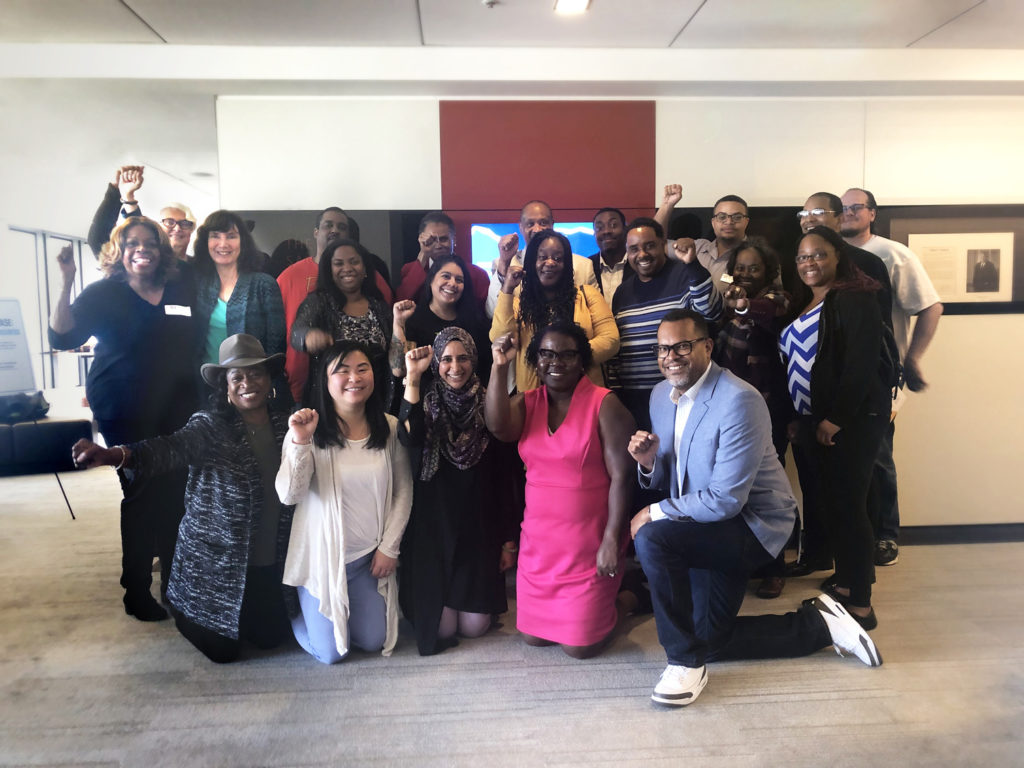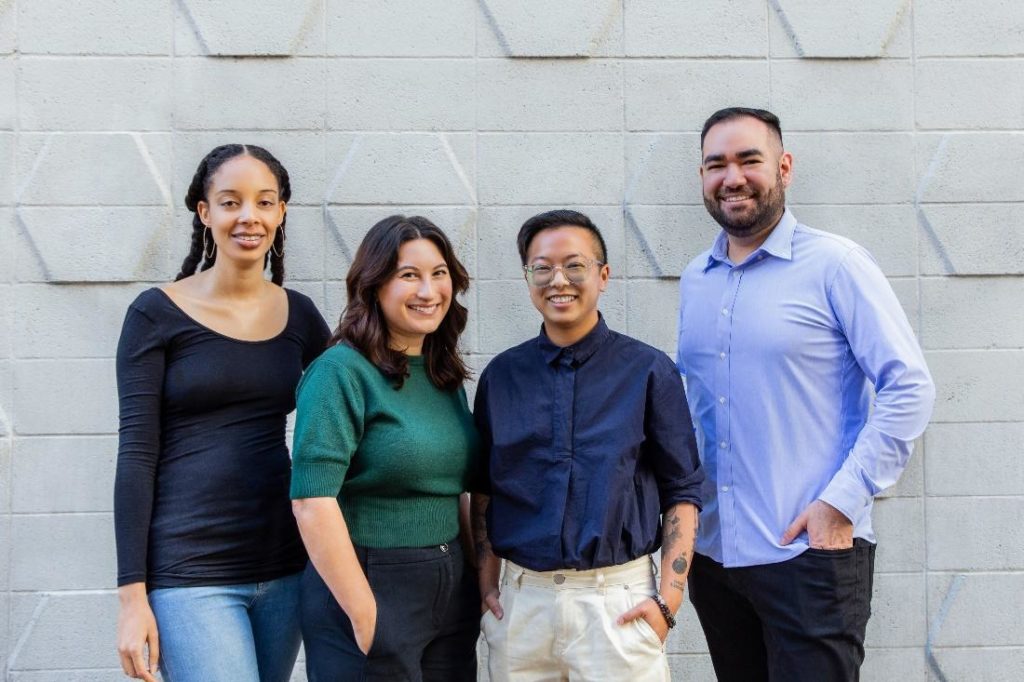Building Community Leadership
Based on our founders’ own values, SFF has, since our inception, made it a priority to nurture the Bay Area’s leaders. Cultivating grassroots community leaders—the people directly affected by unjust systems—is essential to bringing out the best ideas and solutions. We believe it is our most direct path to creating an inclusive Bay Area where everyone thrives.
For decades, we’ve invested in a Bay Area where everyone thrives and feels that they belong. Some of our flagship power-building programs, now decades old and with a network that spans communities and generations, include the Daniel E. Koshland Civic Unity Program, the FAITHS program, and the Multicultural Fellowship Program. Our newest leadership program, Women of Color, Women of Power, formed in 2022, further builds on our long commitment to community leadership.
Establishing the Koshland Program
Did you know?
In its 41 years, the Koshland Program has invested in more than 500 community leaders in 30 different neighborhoods throughout the Bay Area. Through the program, leadership cohorts have helped establish numerous neighborhood-serving organizations, including an immigrant welcome center in San Rafael, a workforce development center in San Francisco’s Excelsior neighborhood, and an afterschool tutoring program in North Fair Oaks, an unincorporated neighborhood in Redwood City.
Our co-founder Daniel E. Koshland Sr. was committed to bringing people together. When he died in 1979, he entrusted the foundation with $35 million—at that time, the largest unrestricted endowment gift SFF had received. To honor his dedication to unifying Bay Area communities, we used the funds in 1982 to establish the Daniel E. Koshland Civic Unity Program, which identifies the region’s unsung leaders—people making a difference, committed to their neighbors and driven by a passion for progress—and makes a five-year, $300,000 commitment to their neighborhood.
“Maybe what we ought to do in his memory is what he did himself,” says Lew Butler, one of Koshland’s mentees who helped create the program and served for many years on the Koshland Program’s committee. “We would pick a community and talk to the leaders in that community and try to support what they were doing.”
“The whole idea of the Koshland Program is to provide resources to informal leaders, who don’t necessarily have official offices or titles, and give them the opportunity to build their leadership and build their capacity,” says Koshland Program Director Retha Robinson, who first joined SFF in 1980 as a word processing specialist.
Despite being generously funded by one of our co-founders, even the Koshland Program has faced challenges. Immediately after the loss of the Buck Trust in 1986, the program’s first director, Nancy Pietrafesa, was laid off along with more than half of SFF’s staff. And as we recouped, recovered, and transitioned between leaders, the Koshland Program was suspended for two years.
When Arnold Perkins was hired as its second director in 1988, he reintroduced and reinvigorated the program. But given our overall drift away from communities in the years immediately following the loss of the Buck Trust, the program needed assurance that it would remain a foundation priority going forward. In 1996, under the leadership of its third director, Elaine Lee, along with the Koshland Committee, the program came to a key agreement with our board. It established a Memorandum of Understanding that ensured SFF would never again pause our grassroots work in local neighborhoods in partnership with local leaders.
How does SFF choose Koshland neighborhoods and fellows? “We’re out in the community. We meet with our grantees. We meet with some of our fellows,” says Robinson. “Folks tell us about the leaders in this particular neighborhood, and we go out and sit and talk to people and just ask them, ‘Who in your neighborhood do you call when there’s a problem?’” Only after engaging with the community do program staff such as Robinson sit down with candidates to have one-on-one conversations about their interests and passions for community-building. In doing so, Robinson says, “You really learn about people’s stories”—about grandmothers who inspired them to become leaders or volunteering experiences that ignited their drive to help others.
Once a neighborhood and fellows are selected for a five-year term, SFF then provides leadership training and strategic planning support to help the group identify a project, target population and goals, as well as implementation and evaluation. Says Alex Tom, a Koshland Excelsior Fellow between 2012 and 2017:
The Koshland Fellowship was a chance for us to bring the different communities together. And it wasn’t just the organizers, but also the service providers, the educators, the small business folks really trusting us with the process. And we were just thinking about what would it look like if we were able to build a sense of community here in Excelsior. The project that we built, which is called Excelsior Works!, has now over 10 staff in the community and has been serving hundreds of families in the neighborhood.
In this way, the Koshland Program continues to carry out the values of SFF’s co-founder Daniel E. Koshland Sr. As Butler, his friend, put it: “Ultimately, societies prosper when individuals do good stuff. So Dan’s vision, I think, continues.”
Founding the FAITHS Initiative

In the early 1990s, former SFF trustee Mary Widener approached Joe Brooks, a SFF program officer, at a board meeting and asked, “How can we put more meaning into what it entails to be a community foundation?”
To answer her question, Brooks reflected on his experiences with communities of color in the East Bay. Growing up as the grandson of a Baptist minister in Berkeley, Brooks watched his grandfather and other congregants support one another and their communities in the East Bay Area. “The African American church in many of the communities throughout the Bay Area … is the main institution that is stable, has been there, and will outlast everything else that’s there,” Brooks says. He wondered: “Why shouldn’t the foundation be connected with faith-based organizations?” In his mind, SFF was well-situated to help these congregations, which were already the cornerstones of their communities, and build upon their capacity to do good.
“We began to have a conversation about what it could look like if we had the congregational community come together, and not just one denomination but interdenominational,” Brooks says. “And that’s what we began to try to organize and assemble. It really came across as something that could make a difference.”
In 1993, SFF invited 15 members of the Bay Area’s religious community—leaders of congregations, interfaith movements, and faith-based organizations—to come together as partners with a common goal: fostering community and revitalizing neighborhoods.
Did you know?
One of FAITHS’ first priorities was to push back on President Bill Clinton’s welfare reform, which “dismantled the safety net that the welfare services provided to low-income communities,” according to former FAITHS program executive Joe Brooks.
Within four years, that initial group grew into the Foundation Alliance with Interfaith To Heal Society (FAITHS), a network of 350 faith-based organizations and approximately 200 nonprofit and community groups. Today, FAITHS connects more than 600 agencies, congregations and organizations.
Rita Semel, who has also been instrumental to FAITHS since the beginning, recalls the early days of the program: “We had people from all over, and as things progressed, we tried to meet whatever the issues were of the day.” Semel, now 101, said in 2021 that her lifelong interfaith work is founded on her strong belief in the power of collaboration. “It is a very simple model. It’s bringing together people to discuss the conditions in which we live, the issues that face us as a community and what each of us can bring to the table to help solve those problems.”
Since its founding, FAITHS has organized interfaith communities throughout the Bay Area on racial equity issues such as housing, voter engagement and participation in the U.S. Census. Beyond grants and organizing work, it also provides faith-based organizations with training to enhance their organizational effectiveness.
In 1995 and 1996, for example, FAITHS partnered with the Center for Ethics and Economic Policy to bring a series of eight-week economic training courses to Bay Area congregations. The program gave early preference to African American pastors, another example of SFF’s longstanding commitment to racial equity.
In April 2020, at the onset of the COVID-19 pandemic, FAITHS mobilized its vast network and began issuing weekly newsletters containing key information to help faith organizations provide communities with support related to sudden unemployment and unstable housing, as well as public health information to help allay confusion and fear regarding the spreading pandemic.
“SFF has really been deep in the congregational community for so long and really believes in the tapestry woven with the interfaith community,” says Michelle Myles Chambers, who leads the FAITHS program today as the program’s senior program officer. “I feel so blessed to be able to live out my calling—working with faith-based organizations to help them build racial equity and economic inclusion.”
Celebrating Multicultural Fellows

In 1981, SFF saw an opportunity to provide early-career professionals with experience in community work, exposure to philanthropy, and an opportunity to hone their leadership skills. By 1989, we named this initiative the Multicultural Fellowship Program, with the distinct mission of connecting young people of color to the world of philanthropy. By the late 1990s, the program had blossomed into a two-year, full-time fellowship.
Fun Fact
Before becoming SFF CEO in 2014, Fred Blackwell joined the foundation as a Multicultural Fellow in 1996, focusing on neighborhood and community development. The program was an important stepping stone for Blackwell, who went on to positions at the San Francisco Redevelopment Agency, the Mayor’s Office of Community Development in San Francisco and the Annie E. Casey Foundation.
Around this time, future SFF CEO Fred Blackwell was sitting in a graduate school class when SFF’s FAITHS program executive Joe Brooks walked in. Brooks gave a presentation to the class about his community development work at SFF that immediately resonated with Blackwell, who soon applied to our Multicultural Fellowship Program. After he was accepted, he turned to Brooks for mentorship:
Joe was very serious about the mentorship component of the multicultural fellowship, and so he was very deliberate and intentional about making sure that I was able to ask him questions about his decision making … to give insight into the things that he thought were important and why he thought foundation work could be fulfilling. That was a very important time in my career.
Blackwell went on to play a pivotal role in our history, helping us develop our equity agenda in 2016 as CEO. He is one of nearly 100 leaders who have participated in the Multicultural Fellowship Program since its inception. It’s a network that continues to grow, advance equity, and build and share power.
Investing in the Power of Women of Color
In partnership with Leaderspring, the Women of Color, Women of Power program is designed to support women of color to move into positions of decision-making power and access to resources while building community power. Bay Area women-of-color leaders will be selected to participate in a year-long training and coaching program focused on racial equity and systems change. As part of a cohort, they will also build strong ties with other rising women-of-color leaders, and this professional network will continue to expand as ongoing cohorts graduate and join.
Our Ongoing Commitment
Our leadership programs reflect our investment in organizing, building electoral strength, and amplifying voices that have long been silenced. They are key to the Bay Area we envision, where communities shape the decisions and policies that affect their lives and, in turn, build an equitable and inclusive democracy.

